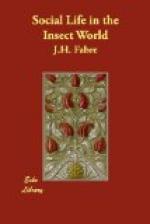Finally, the mother, considering that the matter has been brought to a satisfactory conclusion, departs in search of a favourable place for storage. The father, crouched upon the treasure, waits. If the absence of his companion is prolonged he amuses himself by rapidly whirling the pill between his hind legs, which are raised in the air. He juggles with the precious burden; he tests its perfections between his curved legs, calliper-wise. Seeing him frisking in this joyful occupation, who can doubt that he experiences all the satisfactions of a father assured of the future of his family? It is I, he seems to say, it is I who have made this loaf, so beautifully round; it is I who have made the hard crust to preserve the soft dough; it is I who have baked it for my sons! And he raises on high, in the sight of all, this magnificent testimonial of his labours.
But now the mother has chosen the site. A shallow pit is made, the mere commencement of the projected burrow. The ball is pushed and pulled until it is close at hand. The father, a vigilant watchman, still retains his hold, while the mother digs with claws and head. Soon the pit is deep enough to receive the ball; she cannot dispense with the close contact of the sacred object; she must feel it bobbing behind her, against her back, safe from all parasites and robbers, before she can decide to burrow further. She fears what might happen to the precious loaf if it were abandoned at the threshold of the burrow until the completion of the dwelling. There is no lack of midges and tiny dung-beetles—Aphodiinae—which might take possession of it. It is only prudent to be distrustful.
So the ball is introduced into the pit, half in and half out of the mouth of the burrow. The mother, below, clasps and pulls; the father, above, moderates the jolts and prevents it from rolling. All goes well. Digging is resumed, and the descent continues, always with the same prudence; one beetle dragging the load, the other regulating its descent and clearing away all rubbish that might hinder the operation. A few more efforts, and the ball disappears underground with the two miners. What follows will be, for a time at least, only a repetition of what we have seen. Let us wait half a day or so.
If our vigilance is not relaxed we shall see the father regain the surface alone, and crouch in the sand near the mouth of the burrow. Retained by duties in the performance of which her companion can be of no assistance, the mother habitually delays her reappearance until the following day. When she finally emerges the father wakes up, leaves his hiding place, and rejoins her. The reunited couple return to their pasturage, refresh themselves, and then cut out another ball of dung. As before, both share the work; the hewing and shaping, the transport, and the burial in ensilage.
This conjugal fidelity is delightful; but is it really the rule? I should not dare to affirm that it is. There must be flighty individuals who, in the confusion under a large cake of droppings, forget the fair confectioners for whom they have worked as journeymen, and devote themselves to the services of others, encountered by chance; there must be temporary unions, and divorces after the burial of a single pellet. No matter: the little I myself have seen gives me a high opinion of the domestic morals of the Sisyphus.




